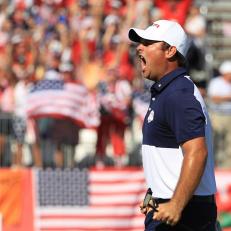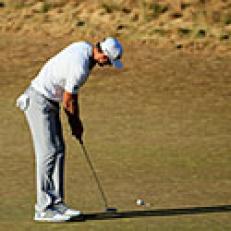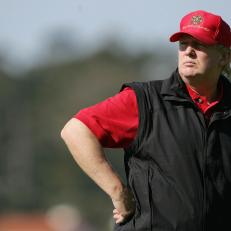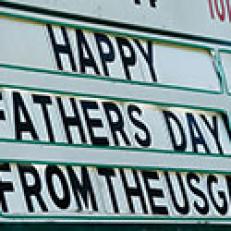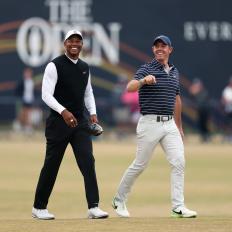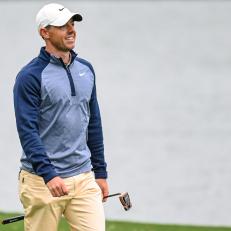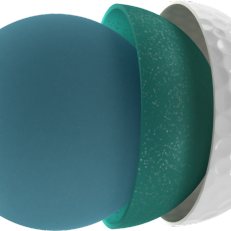He's a natural talent: McIlroy's raw ability was apparent early, and so was his devotion to the game. At age 2, his father Gerry first put a club in his hands. Soon after, he was watching a videotape, "Nick Faldo's Masterclass," so regularly he started calling himself "Rory Nick Faldo McIlroy." Then when his teacher Michael Bannon first taught him a proper grip, he would often go to sleep with his hands wrapped correctly around the club. By age 9, he had won his first big tournament, the Doral Junior Publix Under 10 in Florida, and never looked back.
He's already a veteran at playing in majors: Even before this year, McIlroy had adapted his game to the biggest stages, beginning when he made the cut in the 2007 British Open at Carnoustie at age 18. Two years later, he racked up his first top-five at a major when he posted T-3 at the PGA at Hazeltine, followed by brief, but valuable, experiences with the leads at both the 2010 British and PGA. Neither tournament panned out, but it enabled him to acclimate to major championship pressure at an age when most players would be thrilled just to be there.
He had his Masters disaster and lived to tell about it: If McIlroy's previous majors taught him about getting into contention, his Masters' meltdown was a lesson in how not to stay there. In hindsight, McIlroy admitted he played Sunday at Augusta unsure of how aggressive he should be. His apprehension showed when he imploded on the back nine, but as painful as his 80 was, he said Saturday night, "I now know what I need to do."
Haiti reminded him there's more to life than golf: It goes without saying that McIlroy's trip to earthquake-ravaged Haiti as a UNICEF ambassador was not made with major-championship preparations in mind. But it touched him enough that it made the U.S. Open, and golf for that matter, quite trivial by comparison. That's a healthy perspective on a week like this. "I thought I had perspective before going to Haiti, and then actually seeing it just gives you a completely different view on the world and the game you play."
He had his father with him: At Augusta, McIlroy stayed with friends, but this time around, Gerry McIlroy was in town to settle his son's nerves and help steer him from distraction. And not that he needed added incentive, but his father's presence also reminded Rory of the sacrifices both his mother and father made for his golf career. "They never pushed me. I wanted to go and do these things, and they were very supportive," McIlroy said. "I'm very thankful for them for how far they've gotten me."
Congressional played to his favor: You often hear that the U.S. Open usually comes down to the player who can make the most 6-footers. McIlroy certainly made his share, but as a player whose ball-striking is further along than his short game, the soft conditions enabled him to stop the ball where he wanted and limit the strain on his putter. Maybe the USGA wasn't happy with the way the course played, but McIlroy for one wasn't complaining.
He got off to a fast start: McIlroy started his tournament on two of Congressional's toughest holes, the 215-yard, par-3 10th and the 490-yard, par-4 11th. But while playing partners Phil Mickelson and Dustin Johnson each made a double bogey on one of those two holes, McIlroy had stress-free pars before making his first birdie on his third hole, No. 12. On No. 17 he poured in the first of three straight birdies on his way to a bogey-free 65 to take a three-shot lead after Day 1.
He made an unlikely eagle on Friday: McIlroy made it clear he wouldn't come back to the field with two early birdies in his second round to stretch his lead, but things really started to get out of hand on the eighth hole. After flying his approach to the back of the green, the ball nearly stopped about 30 feet above the hole before starting to feed back down the slope. It didn't stop until it had found the back of the cup for an eagle, making McIlroy just the fifth player to ever reach double digits under par in a U.S. Open.
He got a wakeup call at the end of his second round: After a rare bad drive into the left rough, McIlroy did something rarer during his magical week: he compounded a mistake. Going for the peninsula green, the 22-year old pulled his approach into the water hazard for a double bogey, his first score over par of the week. Despite the double, McIlroy still broke the 36-hole U.S. Open scoring record with a 131 total and lenghthened his lead to six shots. The score reminded him how costly missteps can be at a U.S. Open, and it seemed to resonate: He would suffer no more blowups the rest of the week.
He stayed patient on Saturday: With his double bogey to end Friday's round still fresh in his head, McIlroy faced an early test on Saturday when he found the right rough off the tee on No. 3. As opposed to his blunder the day before, however, McIlroy chose the safer route. He punched back into the fairway, and then spun a wedge into two feet to save his par. What could have been a reminder of his vulnerability ended up reinforcing a need to stay patient.
The few times he stumbled, he was resilient: Another opportunity to begin sliding back to the field could have come midway through his third round, when he made bogey on the par-3 10th and then drove into the left rough on the par-4 11th. But McIlroy then proceeded to send his approach shot directly over the flagstick to 12 feet. He made the putt for birdie to regain the shot he lost, and his momentum.
He made an opening birdie on Sunday Despite his dominance the first three days, many people were interested to see how he would handle Sunday following his Masters collapse. McIlroy answered those questions early by hitting his approach to 10 feet from a fairway divot and cooly draining the birdie putt. The message to his competitors was he wasn't just going to try to hang on.
He made a par save on the second hole of his final round: The opening birdie was nice, but keeping a bogey off his card to keep any doubts from creeping into his mind early might have been even bigger. McIlroy found the green on the long par 3, but after blowing his birdie putt about eight feet past the cup, he made the comebacker to maintain his nine-shot lead and show his playing partner Y.E. Yang that he didn't plan on carelessly giving any shots back to the field.
He made one three-putt all week: And it came when it didn't matter. McIlroy finally had a hiccup on the 71st hole of the tournament after the result was long a forgone conclusion. As Tiger Woods did when he didn't three-putt during his breakthrough victory at the 1997 Masters, McIlroy spent most of his week either draining birdie putts or tapping in for pars. Putting has been known as the relatively weak part of his game, but this performance could change that perception.
He put on a ball-striking clinic: McIlroy was great off the tee, but he was even better on his approach shots, leading the field in greens in regulation. By a lot. In total, McIlroy hit 62 greens or just over 86 percent -- a staggering number for a U.S. Open. Not surprisingly, he won by eight shots and shattered the tournament scoring record by four shots with a four-day total of 268.







